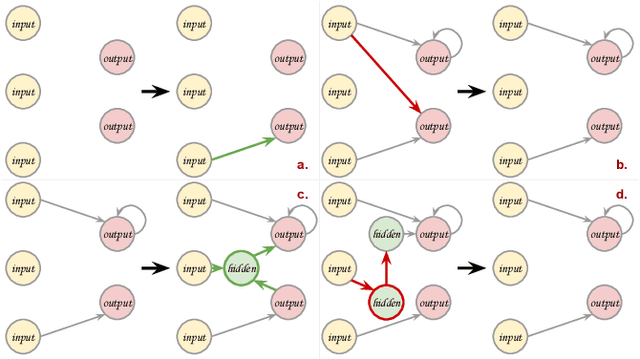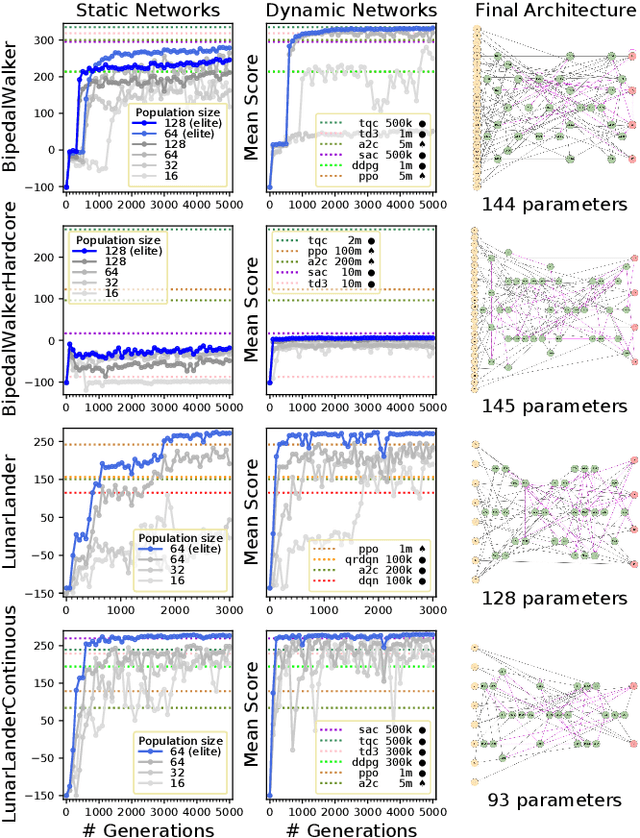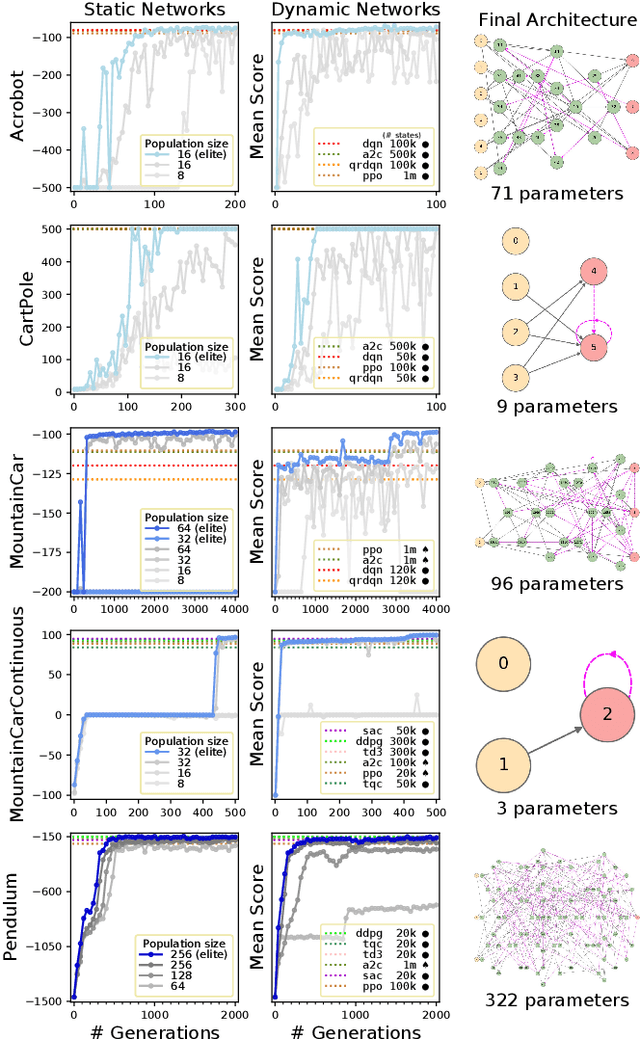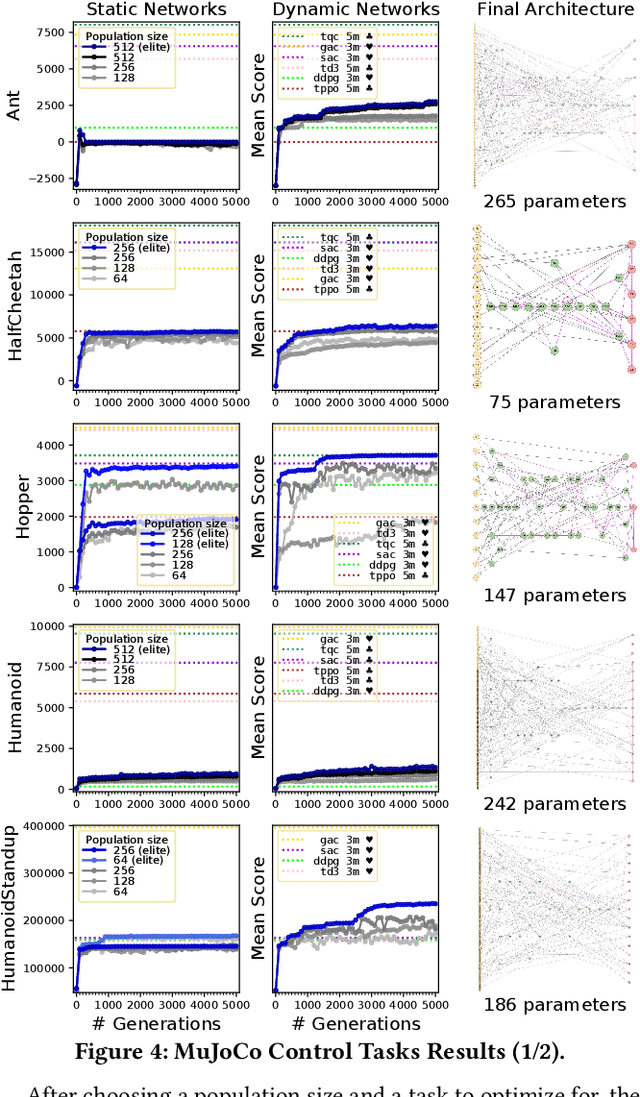Maximilien Le Clei
Neuroevolution of Recurrent Architectures on Control Tasks
Apr 03, 2023



Abstract:Modern artificial intelligence works typically train the parameters of fixed-sized deep neural networks using gradient-based optimization techniques. Simple evolutionary algorithms have recently been shown to also be capable of optimizing deep neural network parameters, at times matching the performance of gradient-based techniques, e.g. in reinforcement learning settings. In addition to optimizing network parameters, many evolutionary computation techniques are also capable of progressively constructing network architectures. However, constructing network architectures from elementary evolution rules has not yet been shown to scale to modern reinforcement learning benchmarks. In this paper we therefore propose a new approach in which the architectures of recurrent neural networks dynamically evolve according to a small set of mutation rules. We implement a massively parallel evolutionary algorithm and run experiments on all 19 OpenAI Gym state-based reinforcement learning control tasks. We find that in most cases, dynamic agents match or exceed the performance of gradient-based agents while utilizing orders of magnitude fewer parameters. We believe our work to open avenues for real-life applications where network compactness and autonomous design are of critical importance. We provide our source code, final model checkpoints and full results at github.com/MaximilienLC/nra.
Generative Adversarial Neuroevolution for Control Behaviour Imitation
Apr 03, 2023

Abstract:There is a recent surge in interest for imitation learning, with large human video-game and robotic manipulation datasets being used to train agents on very complex tasks. While deep neuroevolution has recently been shown to match the performance of gradient-based techniques on various reinforcement learning problems, the application of deep neuroevolution techniques to imitation learning remains relatively unexplored. In this work, we propose to explore whether deep neuroevolution can be used for behaviour imitation on popular simulation environments. We introduce a simple co-evolutionary adversarial generation framework, and evaluate its capabilities by evolving standard deep recurrent networks to imitate state-of-the-art pre-trained agents on 8 OpenAI Gym state-based control tasks. Across all tasks, we find the final elite actor agents capable of achieving scores as high as those obtained by the pre-trained agents, all the while closely following their score trajectories. Our results suggest that neuroevolution could be a valuable addition to deep learning techniques to produce accurate emulation of behavioural agents. We believe that the generality and simplicity of our approach opens avenues for imitating increasingly complex behaviours in increasingly complex settings, e.g. human behaviour in real-world settings. We provide our source code, model checkpoints and results at github.com/MaximilienLC/gane.
Evolving Artificial Neural Networks To Imitate Human Behaviour In Shinobi III : Return of the Ninja Master
Apr 03, 2023Abstract:Our society is increasingly fond of computational tools. This phenomenon has greatly increased over the past decade following, among other factors, the emergence of a new Artificial Intelligence paradigm. Specifically, the coupling of two algorithmic techniques, Deep Neural Networks and Stochastic Gradient Descent, thrusted by an exponentially increasing computing capacity, has and is continuing to become a major asset in many modern technologies. However, as progress takes its course, some still wonder whether other methods could similarly or even more greatly benefit from these various hardware advances. In order to further this study, we delve in this thesis into Evolutionary Algorithms and their application to Dynamic Neural Networks, two techniques which despite enjoying many advantageous properties have yet to find their niche in contemporary Artificial Intelligence. We find that by elaborating new methods while exploiting strong computational resources, it becomes possible to develop strongly performing agents on a variety of benchmarks but also some other agents behaving very similarly to human subjects on the video game Shinobi III : Return of The Ninja Master, typical complex tasks previously out of reach for non-gradient-based optimization.
 Add to Chrome
Add to Chrome Add to Firefox
Add to Firefox Add to Edge
Add to Edge